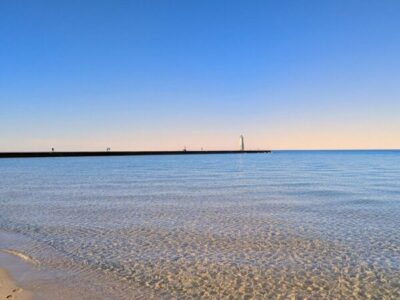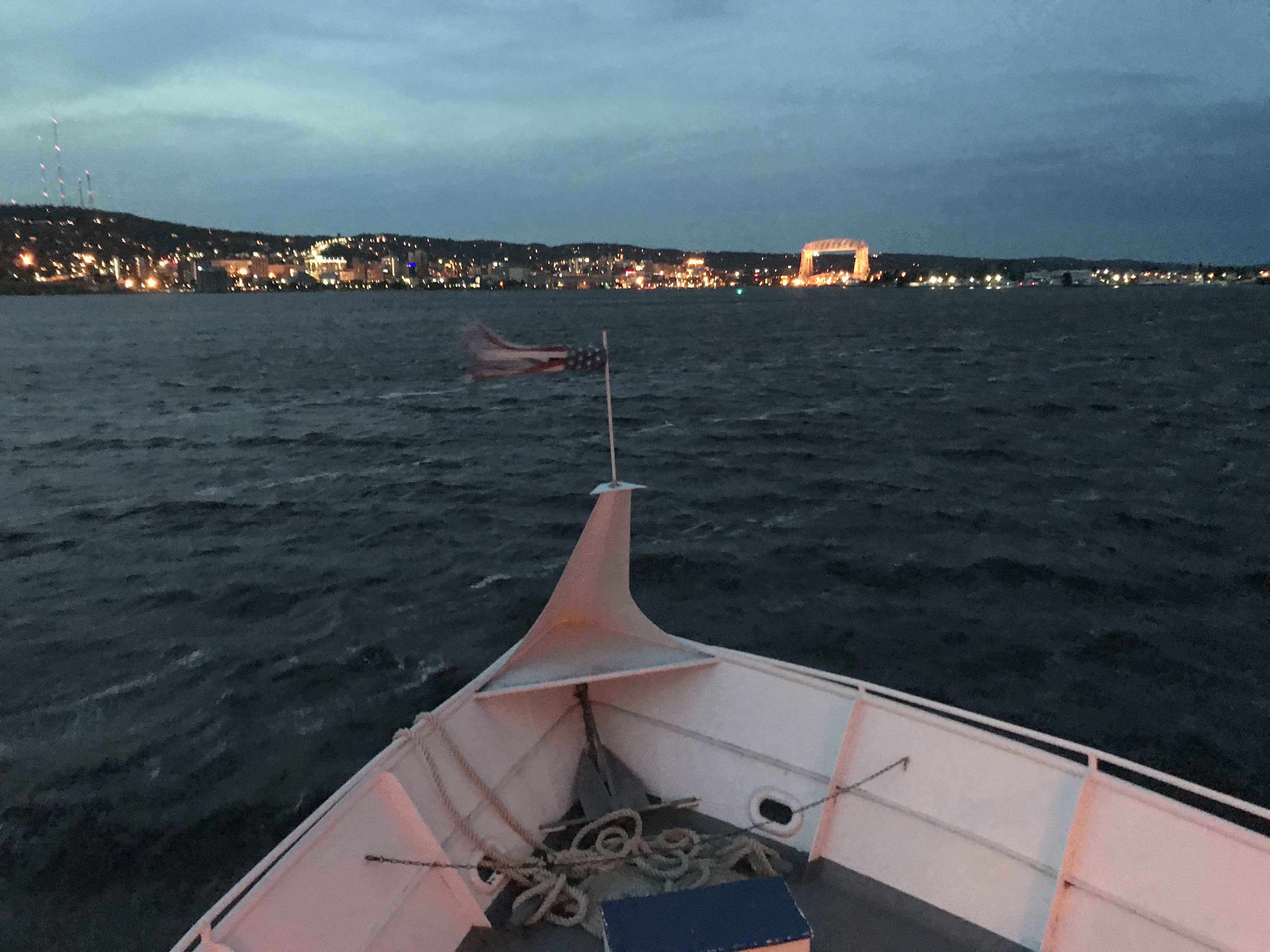
On the first day of the Great Lakes Commission meeting in Duluth, Keynote Speaker Minnesota Congressman Rick Nolan kicked off the gathering by ticking off some of his biggest concerns about the future of the Great Lakes: repair of the aging Soo Locks, making sure the Great Lakes Restoration Initiative and Sea Grant programs continue to be funded, protecting the Harbor Trust Fund which is financed by the shipping industry, and preparing for the effects of climate change.
Congressman Nolan said, “Scientists project the Great Lakes temperatures could rise by as much as 11 degrees by the end of this century which would have a negative effect on the fishing industry and commerce”. He said this isn’t just an issue for the Great Lakes – it’s an issue involving the very survival of our species.
The Commission took on a wealth of tough and controversial subjects throughout the day, including the impact of the federal budget on the Great Lakes, improvement of clean water services and infrastructure, and agriculture conservation and the Farm Bill. Michigan Department of Agriculture’s Andrea Stay and John Switzer praised farmers for voluntarily helping to reduce run-off, especially along the shores of Western Lake Erie. They said farmers are using peer pressure to urge their colleagues to help stop pollution in the Great Lakes.
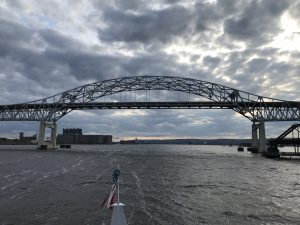
Boat tour under bridge on St. Louis river, courtesy of Mary Ellen Geist
The commission took attendees on a boat tour of the St. Louis Estuary, one of the largest freshwater systems on the Great Lakes, where several bald eagles soared over newly restored wetlands and where contaminated slips were in the process of being cleaned up. Duluth’s improved waterfront is often cited as an example of ways Great Lakes cities are recovering from the wounds of industrial pollution and using their identity involving water and recreation as an economic driver.
The second day of the meeting began with a drum circle by the Fond du Lac Tribe of
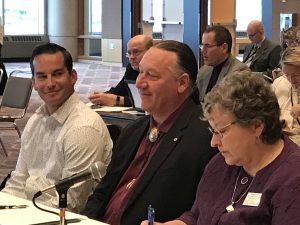
Tribal leaders Thomas Howes, Michael Isham Jr, and Karen Diver, courtesy of Mary Ellen Geist
the Lake Superior Chippewa. Several Tribal Leaders expressed the need for Native Americans to be officially involved with the commission. Michaeil Isham Jr, Chairman of Great Lakes Indian Fish and Wildlife Commission said,” Native Americans need to be included in decision-making for the Great Lakes.” He asked the commission to “seek out elders who have tribal ecological knowledge of the Great Lakes.”
Karen Diver, College of St. Scholastica Faculty Fellow of Inclusive Education, who served under President Barack Obama as Special Assistant to the President for Native American Affairs, said, “This is one of the first times Native Americans have been included in the Great Lakes commission and with all due respect, it is long overdue”. She called for a “basin-wide” approach to improve water quality and infrastructure. She said, “Water is going to be the new oil and it’s sitting right out there.”
Diver said in 2004, Native American Tribes held an accord and asked for permission to participate in issues involving the future of the health of the Great Lakes. She said, “Unless states and provinces are consulting with First Nations in a federal and state hierarchy, their voices will not be heard. These are traditional homelands for our people.”
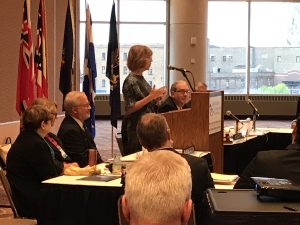
Lt. Governor Tina Smith, courtesy of Mary Ellen Geist
Minnesota Lt. Governor Tina Smith said “Water is our Infrastructure” and urged the commission to continue to protect the health of the Great Lakes for future generations.
The second day of panels addressed not only issues of tribal governance, but included a presentation by The U.S. Army Corps of Engineers about the Brandon Road study to try to keep Asian Carp out of the Great Lakes. The project which consists of noise systems and electric stunning barriers will cost 275 million dollars. Colonel Craig Baumgartner, Commander of the Rock Island District said the project could be completed by 2025. Some Commission members and others expressed concern about accessibility to meetings about the study where the public can comment. (comments are being received on-line through November 16th at glmris.anl.gov)
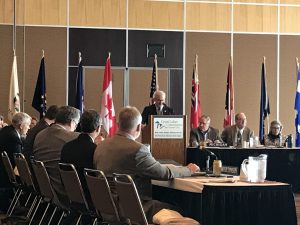
New Great Lakes Commisson Chair John Linc Stine, courtesy of Mary Ellen Geist
New Chairman of the Great Lakes Commission John Linc Stine said, “Clean water, drinking water, and stormwater infrastructure are major issues. One of the key factors as we look at revitalizing our infrastructure is, is clean water affordable? Is it accessible to all? Is there equitable access to safe drinking water? We see rising rates across the nation and there’s a big challenge ahead of us.”
At the end of the meeting commissioners voted unanimously to endorse a joint action plan to “address the growing water infrastructure crisis in the Great Lakes Region.” The plan outlines specific actions to address $271 billion dollars in upgrades and repairs to water-related infrastructure in the 8 Great Lakes States and two Canadian provinces over the next 20 years. The commission also passed a resolution to urge government agencies to research and address the effects of contaminants of emerging concern on the Great Lakes, including chemicals, pharmaceuticals and microplastics.
The next commission meeting will take place March 6th and 7th in Washington D.C.
For more information go to www.glc.org.


